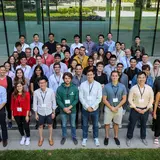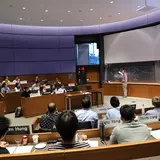
Micro Organizational Behavior Internship Introduces College Students to Graduate School Research
The Yale School of Management’s Micro OB internship is an immersive experience for nontraditional and underrepresented students considering careers in the field of organizational behavior.
By Karen Guzman
Three Yale School of Management faculty members spent the summer introducing students to the field of micro organizational behavior (OB) during an innovative internship program that also showcases the benefits of a PhD education.
For nine weeks in July and August, Yale SOM hosted the Yale Summer Internship in Organizational Behavior, an immersive experience for nontraditional and underrepresented students considering careers in the field of organizational behavior. Professors Michael Kraus, Amy Wrzesniewski, and Cydney Dupree coordinated the conference. Seven undergraduates and recent college graduates—selected from a pool of 200 applicants—attended. The initiative was funded by Yale SOM and by the Initiative on Leadership and Organization.
“These interns are looking to get a PhD in OB or a related field,” Kraus said. “We created this internship to give them a better feel for both the field and what graduate school is really like.”
Micro organizational behavior, Kraus said, is the study of how individuals within teams organize and behave. It is a subset of the larger field of organizational behavior, where researchers also study more macro level questions related to how larger groups (e.g., industries) interact with each other and society.
The SOM internship, which launched in the summer of 2017, is reserved for students from backgrounds that have been traditionally underrepresented in higher education. This includes students of color, as well as students who have taken nontraditional paths to the academy, Kraus said.
The internship serves the primary purpose of broadening the pipeline of underrepresented students pursuing PhD degrees. “We certainly are trying to diversify the academy,” Kraus said. “We’re hoping that other disciplines will eventually start their own programs.”
The interns worked on independent research with faculty and with Yale SOM graduate students. They also took part in research training and professional development activities.
“This program provides an immense service,” said Dupree, an assistant professor of organizational behavior. “Unpaid internships typically offered by notable labs limit the field to students who can afford to spend a summer working without pay and who may already have connections in the field. This internship expands the pool of future researchers by providing paid, hands-on research experience and professional development to students.”
Intern Enya Entung Kuo, a senior at UCLA who plans to pursue a PhD in social psychology, called the internship an “incredibly meaningful and rewarding experience.”
“I learned about statistical procedures such as meta-analyses,” Kuo said. “The research seminars broadened my exposure to literature in both OB and social psychology. We covered topics ranging from race and diversity to the meaning of work. Amy, Cydney, and Michael all challenged us to think more critically about the methods of research, question what we thought we knew, and consider implications beyond the papers themselves.”
Wrzesniewski, the Michael S. Jordan Professor of Management, said the program was a joy to help run. “It represented a powerful way to help talented students,” she said.
“Too often, these kinds of intern opportunities are available in unfunded positions to those with inside connections to research faculty. We wanted to break this cycle by identifying, recruiting, and fully supporting terrific students to come spend the summer doing research with us. We hope to count them among our colleagues in the field someday.”
Intern Kimberly Zuniga is a senior at Pace University studying applied psychology and human relations. “My work at Yale allowed me to better understand the value of research and taught me to think critically about why research matters and how it is positively contributing to society,” Zuniga said. “I learned valuable skills and feel better prepared to apply to graduate programs.”


